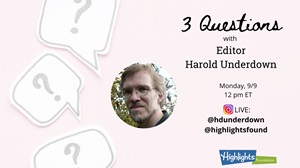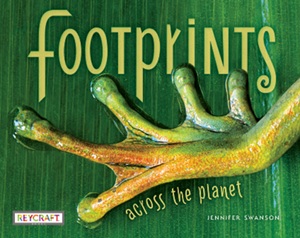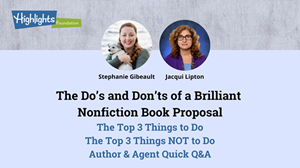Editor Harold Underdown joined Highlights Foundation Social Media Manager Cat Galeano on Instagram Live to talk about what he thinks is new and different on the submissions side of children’s publishing–and how creatives can navigate the changes.
From their chat: “In terms of what’s new and different about now, I, I think there’s differences and changes really in terms of both what creative people are doing and what publishers are doing. And what creative people are doing is working a lot harder on their craft and making sure that they’re writing and illustration is really up to the standards that it needs to be and that means there’s just more competition…for those who are trying to break through, it, it just increases that challenge of of being noticed and of of being selected once they’re noticed….certainly right now you wanna make sure you know not only that you’re continually learning and growing and increasing your skills, but that you’re doing everything you can to understand how the business works, what the best practices are, and so on.”
Watch the conversation below. (Please note: closed captions are available in the video below. You can see them by hovering over the bottom of the video and choosing the “CC” icon.)
Cat:
A big hello to our Highlights Foundation family. We’re so happy to have you here with us this afternoon. For those that may not know me, I’m Cat Galeano, my pronouns are she/her. I’m the social media manager at the Highlights Foundation, joining you from Westchester, New York on the traditional lands of the Seewanoy people, which is Western New York. Apart from all the fun things I get to do at the Highlights Foundation, I am also a reader and a writer myself so getting to talk to our fculty and friends is just so exciting to me because as I’m asking them questions, I’m also still learning very much. And I’m very excited to have Harold, our editor, Harold Underdown here and he will be teaching the upcoming two-night mini Practical Matters in Children’s Book Publishing.
But before we dive in, I just wanted to remind our viewers that joining in on any Highlights Foundation sessions, to do so with no hate, no harm and no harassment of any kind. Now let’s get started. Children’s publishing, I feel like, always seems to be an interesting place. But what makes you think this is an interesting time?
Harold:
At this time in particular, yeah, I mean that that’s such a great question because you know, I feel like ever since I started working in the business, which was back in the previous century, that it’s, there’s always been something happening and many of those things just kind of add to the challenges for writers and illustrators getting started or trying to continue their careers. And you know, I, I can remember, for example, when publishing houses all started closing their doors and no longer looking at unsolicited submissions and thereby created a whole new layer of having to submit to agents and artists’ reps to make contact with publishing house and now that’s–except for, you know, interesting exceptions among smaller publishers for example–that’s kind of the routine and we just accept that.
In terms of what’s new and different about now, I, I think there’s differences and changes really in terms of both what creative people are doing and what publishers are doing. And what creative people are doing is working a lot harder on their craft and making sure that they’re writing and illustration is really up to the standards that it needs to be and that means there’s just more competition. And for me, that’s a wonderful thing, because there’s so much to look at and to, and to be able to choose between. But for those who are trying to break through, it, it just increases that challenge of of being noticed and of of being selected once they’re noticed. At the publishing end, I feel like this is just something that’s been going on gradually through the history of publishing: it’s, publishers have sought to cut back and trim back and become more efficient and what that often means is they’re reducing the amount of time that staff can spend looking at submissions. There’s only so much you can do to kind of outsource that to agents. The agents now are acting like a kind of filter, but after they’ve done that filtering for us and said look, you know, we’ve found the perfect thing for you, we still have to look at that and make a decision about it and say “Oh yeah. This is the right thing for us. This is what we want to acquire” or we still have to say “Well, you know this needs further development and here’s some thoughts I have about that.”
So. It’s always going to be the worst of times. It’s always going to be the best of times. But certainly right now you wanna make sure you know not only that you’re continually learning and growing and increasing your skills, but that you’re doing everything you can to understand how the business works, what the best practices are, and so on. And, and so courses like Practical Matters or the more extensive Crash Course, I,I think they’re really a necessary part of that. And I, I’ve been speaking about these subjects for a long time.
Cat:
As someone who is going to dip their; re-dip their toe into querying soon, I love getting to watch your courses and just learn. Because I feel like it’s so foundational to just kind of go back to the basics to just learn and and re-educate yourself on, like, all the other things going on. Because like, you know, I’ve been so focused on the manuscript and revising and getting it to my mentor. Getting it back, you know, working on the craft, but like also things are happening on the outside that I’m just not paying attention to so that’s why I find it Crash Course and particularly this Mini so important of just like getting back into the basics. Which sort of leads into my second question, which we kind of already mentioned, that you also teach Crash Course, which is a multi-week course, but this Practical Matters is a Mini and it’s essentially a distilled version of Crash Course and so: what’s the most gratifying part about teaching this kind of intro to kid lit class?
Harold:
You know what? What’s the most gratifying about it isn’t necessarily someone asking a question and and me being able to answer it right at the moment of the course. It’s, it’s what I hear later. It can be years and years later. That people who’v,e who’ve taken the Crash Course or you know, back in the day, I was giving workshops like this in person. Like at, you know, local SCBWI conferences or out at the Highlights Foundation campus. And people I met would come back to me and they’d say, you know what you told me about how to put together a query letter or what I learned about the submissions process or some of those details about how a contract works–those were really useful for me and I really, you know, I appreciate you having told me that. And that’s, you know, that’s how I know that there’s a need for a course like this, which is different from a lot of the the necessary courses on the craft. You certainly need to craft. There are a lot of great courses that all you should be availing yourself of those but I just, I find it really satisfying to reflect on what the things are that people need to know and, and really work to provide those in, in a kind of, in a compact and organized way.
Cat:
Yeah, because if you think about it like for me, I mostly consider myself a creative, so things like contracts are just such foreign concepts. So whenever I dip back into your, into either your Mini or the, the Crash Course, it just like refreshes, oh, things that I’m just not thinking about at all through the writing and revising process. So I completely agree with you on the importance of this and and taking the refresher class if you’ve already taken it before or, you know, taking the Mini, because that’s just like a bite size of all the things that you need to remember. So whether you are seasoned or you’re new, I do feel like this is important to kind of refresh yourself because it’s important because you know, we’re a little on the artistic side. So it’s good to remember the other side of the business. Which essentially is the thing that we forget: It is a business, yeah, so.
Harold:
You mentioned something that reminded me of a point I want to make, which is when it comes to contracts that, you know, you might think as someone who is probably going to be working with an agent–if you aren’t already–oh well, I can leave the contracts up to my agent. But I, I would tell anybody, you, you don’t want to leave it up to your agent. You want to make sure to understand what you’re signing. And it, if that means asking your agent to explain it to you, that’s part of their job. But there are things you can learn in advance just about the way of publishing contracts and, and that’s one of the things I go into.
Cat:
Yes. And as someone who has, like I mentioned, audited this class, I highly, highly, highly–and monitored–highly recommend you take it just so you can understand some basics because ultimately we are thinking about the, either the writing part or the illustrating part. But again, can’t stress enough the importance of remembering the business side too. So my last question to you is: why is it important now more than ever to have a foundational understanding of the industry before you start querying, submitting or any else kind of like diving right into the into the business?
Harold:
Well, if you don’t have that understanding you, you’re not necessarily going to be going about it the right way. I mean, that’s what it comes down too. And that, that applies both in terms of like how you, how you write the query letter. The structure of it, the information you include and also how you go about deciding who to send it to. And it, it’s very easy to beat your head against the wall, sending a submission to a company that doesn’t publish that kind of book or an agent that doesn’t represent that kind of book, and that’s, you know. that’s just one example of the kind of thing you need to, you need to both know that it’s something you need to figure out, and how you can figure it out, where you can do the research, that kind of thing.
Cat:
Yeah, because you don’t want to make silly mistakes at the beginning and your query not even get looked at, for example. Or you know, jump the gun and and like, think your, your manuscript is perfect when truly you’re probably the only one who’s looked at it. So it’s like, it’s important to, to educate yourself on–like I keep mentioning–on the business side of things so that way you have the strongest possibility to be seen. And then you know, every level after that with an agent and then getting a contract and then getting published. So it’s just important to have that foundation and I think that’s what you do so beautifully with these courses. Especially in the Mini, which is just like the bite-sized version of the Crash Course. But just understanding that and how important it is to have that, that base, like anything else, when you’re learning something new or or starting something fresh. It’s important to have that foundational start before you dive into it so you’re not just kind of waddling in no direction. You’re, you’re at least understanding and moving towards the greater goal. Well, that’s the last question from me. If anyone else has questions, we have a couple minutes left. I just see a lot of love and a lot of hello. We have someone tuning in from Pakistan. Welcome! That is so far away and so amazing. Hi, Molly. Yeah. So if anyone has any questions, please feel free to type that in now and if not, we’re going to wrap this up. And I don’t see any questions coming through. So I’m gonna have to say goodbye to my friend Harold.
Harold:
Thanks! It’s been good talking with you.
Cat:
So if you would like to join Harold for Practical Matters in Children’s Book Publishing, please run over to our website and register: highlightsfoundation.org. This kicks off next week and thank you Harold for hoining me and for chatting with me. It’s always a pleasure to to pick your, pick your head on some really exciting questions about the courses we’re teaching. So as always, thank you for your time. Yeah, and thank you everyone for joining us.
Harold:
Thanks, everybody.







